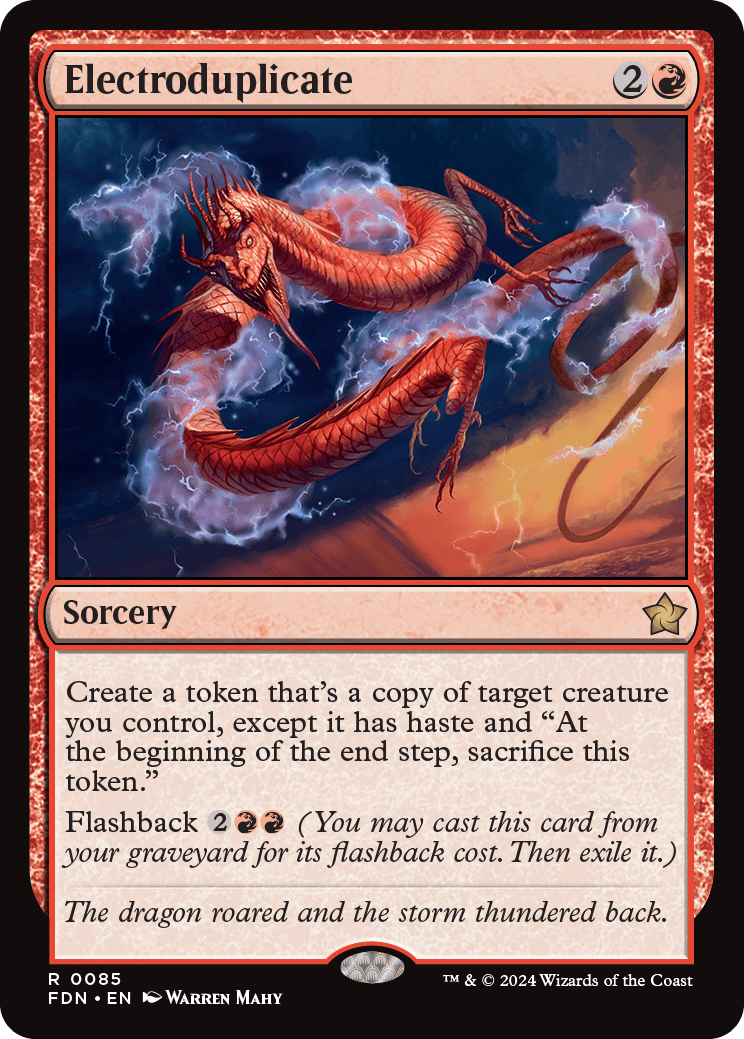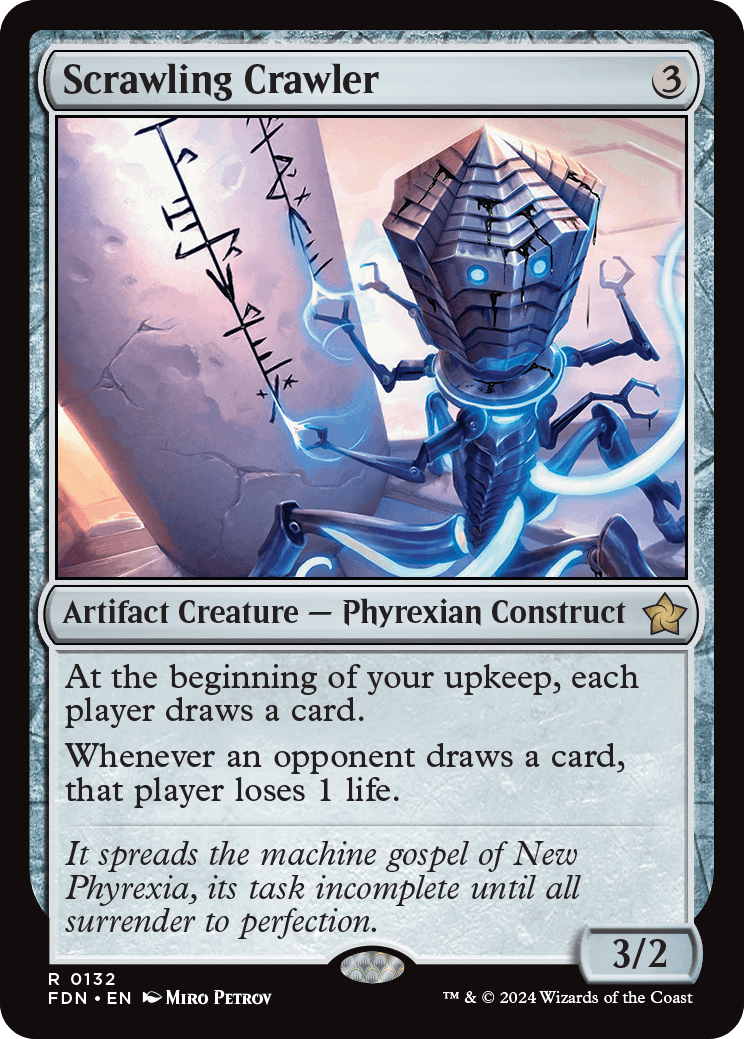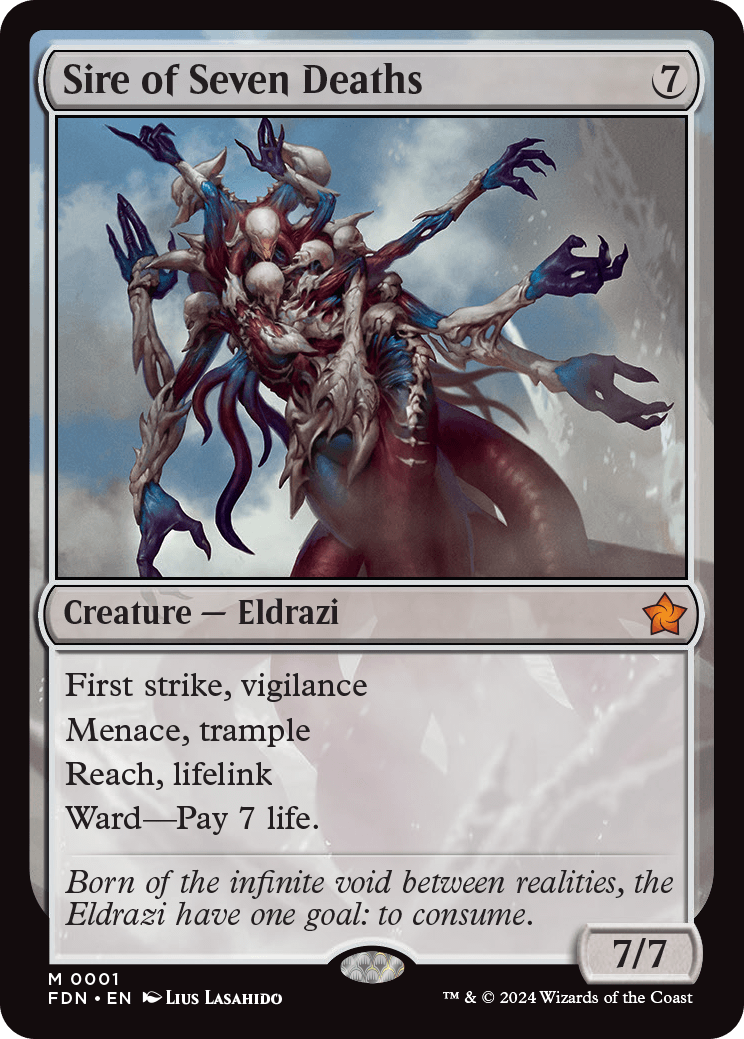Welcome to Foundations! This set serves as a starting point for Standard players over the next few years, to introduce the format with a reliable pool of cards to choose from. And it is a DEEP pool – there are over seven hundred and twenty-nine collector numbers in this set! We’ve waded through the full list to bring you this guide so you’ll know which triggered abilities to watch out for, with explanations for any special remedies that might apply!
Seven cards have one or more triggers that upgrade to a Warning when missed:
“[create a token …] ‘At the beginning of the end step, sacrifice this token.’”

Self-destructing tokens are a classic in red – Chandra by herself has had three printings that create them! Since the same effect that’s creating the tokens also sets up a trigger to sacrifice them later, we classify these triggers as “undoing a zone change”. That means there’s no expiration on the fix! Once it’s discovered that a player forgot to sacrifice this token, the opponent will choose whether it disappears now or at the start of the next phase.
“[create a token …] ‘At the beginning of the end step, sacrifice this token.’”
More self-destructing tokens! They even use the same exact text! Be mindful that these triggers are considered “printed” on the tokens themselves, so any extra copies of that token – regardless of how they’re created – will also copy that triggered ability.
“When this creature enters or dies, mill two cards.”
It’s been a while since our last generally detrimental self-mill card. Remember that judges CANNOT account for the context of the game that’s being played or the deck a card is in when evaluating its triggered abilities; we can only consider the text of the card itself. Even though we’re most likely to see the Crow in decks where its controller wants to mill themselves, by itself the card doesn’t benefit in any way from putting cards into the graveyard, so it must be considered a detrimental trigger.
“[another target Goblin gains …] ‘When this creature deals combat damage, sacrifice it.’”
Goblins keep finding creative new ways to sacrifice themselves! If a player forgets this triggered ability after their Goblin lands a hit in combat, they receive a Warning and the opponent chooses whether to add it to the stack or not. Keep in mind that this trigger is NOT undoing a zone change the way Chandra, Flameshaper and Electroduplicate did earlier! That means this remedy is only good for one turn cycle; once we reach combat damage on the next player’s turn it’s too late to apply any remedy, so after the Warning the game simply moves on.
“At the beginning of each player’s draw step, that player draws an additional card.”
Howling Mine is a classic! While the Dictate improves on Howling Mine by letting its controller benefit first, there’s still the downside of letting the opponent draw cards, too. So this symmetrical trigger will upgrade to a Warning if it’s missed during an opponent’s turn, but there’s no penalty if it’s missed during its controller’s turn.
“At the beginning of the end step, sacrifice this creature.”
It’s been a while since Ball Lightning had a Standard-legal printing! Although this trigger doesn’t technically fall under the “undoing a zone change” special remedy, judges will always be able to offer the regular remedy since it triggers every end step – meaning it’s never more than one turn since the most recent time this trigger was missed.
“When there are four or more page counters on Mazemind Tome, exile it. If you do, you gain 4 life.”
We last saw Mazemind Tome among the retro artifacts of The Brother’s War, and nothing’s changed since then: it will almost always be more valuable to keep scrying and draw cards than to get a one-time boost of 4 life. And since this is a state trigger, it keeps triggering as long as the condition is true, so it’s never more than a turn since the last time this trigger was missed.
Four notable cards have a trigger that does NOT upgrade when missed:
“When this creature enters, mill three cards.”
Unlike the Crow of Dark Tidings above, this creature has a threshold ability along with its self-mill trigger, so it directly benefits from filling the graveyard! That’s enough for it to be considered “not generally detrimental”, so this won’t get a Warning if players forget to mill.

“At the beginning of your upkeep, each player draws a card.”
This looks a bit like Howling Mine territory, but there are some key differences. First, this ability gives each player a card each time it triggers, rather than triggering individually per player. That means it isn’t symmetrical. And second, the card has another ability that hurts the opponent when they draw cards, including from this trigger. That means this isn’t benefiting them as much as it benefits its controller.
3. Demonic Pact
“At the beginning of your upkeep, choose one that hasn’t been chosen — [deal damage]; [opponent discards]; [you draw]; You lose the game.”
One of these modes is not like the others! Dealing damage, drawing cards, and forcing an opponent to discard all sound great. But losing the game obviously makes it pretty difficult to win the game, which is most players’ objective.
When judges evaluate a triggered ability, though, the entire trigger has to be considered. That’s part of what “generally” means in “generally detrimental” – a triggered ability has to harm its controller in most cases to qualify. 3 times out of 4 this trigger is upside, so there’s no upgrade if a player forgets this trigger the fourth time (unless they’re Cheating by intentionally missing it).
2. Dragon Mage
“Whenever Dragon Mage deals combat damage to a player, each player discards their hand, then draws seven cards.”
There will sometimes be game states where connecting for damage with the Dragon Mage is a downside for its controller, discarding critical cards from their hand or refreshing an opponent’s empty hand. Despite that, this trigger usually benefits its controller. They get first access to a fresh 7 cards, and similar to Fleshbag Marauder and its kind we assume that a player who puts this style of effect in their deck is planning for it and expects to benefit more than their opponent.
Other notable cards and mechanics:

1. Sire of Seven Deaths and Zul Ashur, Lich Lord
“Ward — Pay 7 life.” and “Ward — Pay 2 life.”
Opponents will often call out in regular play that they’re paying for a Ward proactively, but it’s never actually their responsibility to do that. It’s always on the trigger’s controller to point it out. That can be especially tricky with “invisible” Ward triggers like these, where paying the cost doesn’t line up with either tapping lands or moving cards from one zone to another.
Keep an eye out for “pen trick” bluffs that opponents may attempt against these cards; things like targeting them with a spell, then picking up their pen to make an unrelated note on their notepad. To the controller this can look like a life total change from the Ward trigger being noted! But they should always, always, ALWAYS confirm life totals, any time that information changes.
If a judge notices that two players have different life totals recorded, they should intervene to clarify the game state before it gets too complicated to fix. But if the life total change or the payment of these Ward triggers wasn’t clearly announced, then it’s missed.
“[create tokens.] When you do, tap target creature an opponent controls.”
We don’t usually see reflexive triggers on instants and sorceries! Keep in mind, players don’t have to announce a target for this trigger until it goes on the stack, which is after the Faebloom Trick resolves. If they announce a target early, though, they have to stick to that target unless the opponent intervenes.
And most important: reflexive triggers like this are considered automatically acknowledged by taking the action that triggers them! Usually this applies to things like announcing that a creature is Exerted as it attacks, which counts as calling out its “when you do” trigger. But in this case it means creating the Faerie tokens counts as acknowledging the tap triggered ability. Opponents shouldn’t be penalized if they don’t remind the player, but judges should intervene immediately if they notice this is missed, and it’s handled as a Game Rules Violation for resolving the trigger incorrectly rather than as a Missed Trigger.
“Whenever an opponent casts a spell, that player loses 5 life unless they discard a card.”
As always, the Quandary’s controller is the only one responsible for acknowledging its triggers! An opponent who resolves their spell without either paying life or discarding a card has done nothing wrong, even if they know the trigger is being missed.
“When Starlight Snare enters, tap enchanted creature.”
Surprisingly, this is the only card in the set taking advantage of one of our special remedies! When an Aura has a triggered ability that only affects the enchanted object, that trigger can’t be missed. The opponent still isn’t required to point it out… But as soon as the error is noticed, the trigger immediately resolves before any other actions.
Thank you for taking the time to join us! Hopefully this guide serves as a strong base to build from as you explore more of the set. A stable, reliable root for further knowledge to bloom. A foundation, one might even say!
The next set that we cover, Aetherdrift, will catch up to us before you know it – make sure you’re back February of 2025 for our review!
